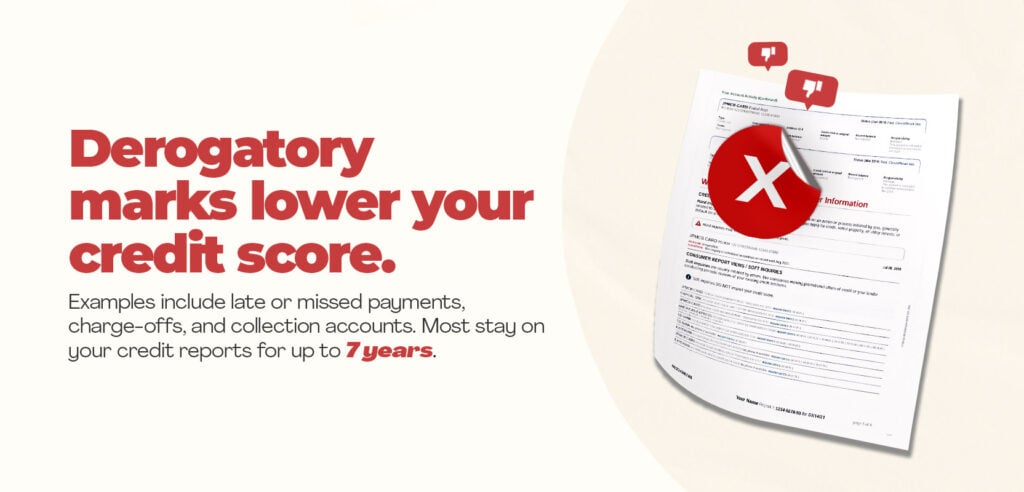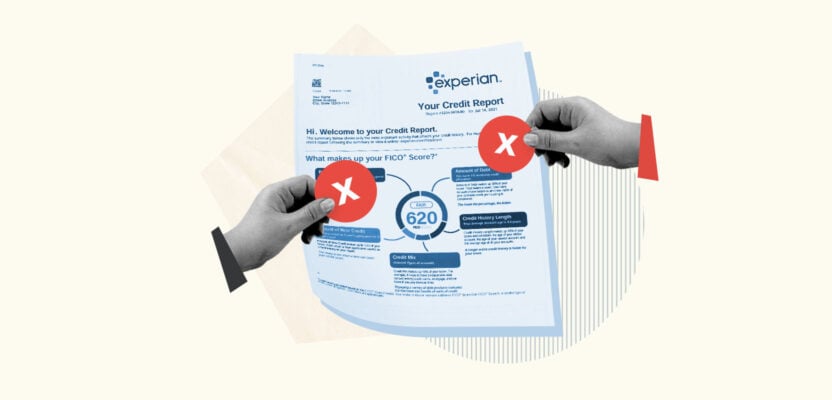If you run into financial trouble or forget to pay a bill, you may begin seeing derogatory marks appear in your credit report.
As you’ve probably already guessed, derogatory marks are bad news, but what exactly does “derogatory” mean in the context of credit reporting? More importantly, how can you stop derogatory marks from hurting your credit?
Table of Contents
What is a derogatory mark?
Derogatory marks are negative items on your credit report. They serve as red flags for potential lenders.
Derogatory marks are records of events (such as times when you failed to pay one of your bills on time) that show you’ve had trouble managing your debts. They suggest that you may have similar difficulties in the future, which will make lenders reluctant to extend credit to you.
Derogatory information is usually provided by your creditors (e.g., credit card companies and loan providers), debt collection agencies, or public records.
Most derogatory marks stay on your credit report for 7 years and will be automatically removed after that period. However, the exact amount of time a derogatory mark will remain on your credit report depends on what type of mark it is.

What are the types of derogatory marks that can appear on your credit report?
There are several different types of derogatory marks. The table below defines them and explains how long they’ll stay on your credit report, as well as how you can get them removed.
Types of Derogatory Marks and What to Do About Them
| Derogatory Mark | Description | Time on Credit Report | What to Do |
|---|---|---|---|
| Late payments | Payments made 30+ days past the due date | 7 years |
|
| Charge-offs | Debts that your creditor wrote off as a loss | 7 years + 180 days |
|
| Collections | Debts sold or transferred to a debt collection agency | 7 years + 180 days |
|
| Repossessions | Cases where your lender seized the asset you were using to back a secured loan | 7 years |
|
| Debt settlements | Debts that you settled for less than the full amount owed | 7 years |
|
| Foreclosures | Cases where your mortgage lender seized your home due to missed payments | 7 years |
|
| Chapter 7 bankruptcies | Public records of chapter 7 bankruptcy filings (debts fully cleared) | 10 years |
|
| Chapter 13 bankruptcies | Public records of chapter 13 bankruptcy filings (partial repayment) | 7 years |
|
Sources: The Fair Credit Reporting Act, TransUnion, and the United States Courts (for chapter 7 and chapter 13 bankruptcy).
Can you remove derogatory marks from your credit report?
Yes, it’s sometimes possible to delete derogatory marks from your credit report. The amount of time that they stay on your credit report is dictated by the Fair Credit Reporting Act, but you may be able remove negative marks on your own if they’re invalid or you persuade your creditors or debt collectors to stop reporting them.
You can use the information in the table above to get started on removing the black marks on your credit report, but we’ll also explain the process in more detail at the end of this article.
Are credit inquiries considered derogatory marks?
No, inquiries on your credit report are not considered derogatory, regardless of whether they’re hard inquiries or soft inquiries. 1 Although hard inquiries may cause a small drop in your credit score, they’re simply records of your applications for new credit, and they’re neither positive or negative. Their negative effect also only lasts for a few months. Soft inquiries have no effect on your score at all.
How do derogatory marks affect your credit score?
Needless to say, derogatory marks are bad for your credit. However, the amount that your credit score will suffer depends on several factors, including:
- The type of negative mark that it is
- The type of account involved
- How long the mark has been on your credit report
- The initial state of your credit
The worse the action was that caused the mark, the greater the hit to your credit score will be. For instance, a payment that was late by 30 days won’t hurt your score as much as one that was late by 90 days. Major derogatory marks like charge-offs (which indicate that your payment was so late that your lender gave up on collecting it) are even more damaging.
Negative items also have the greatest effect on your credit score when they’re first added to your credit report. Their impact gradually diminishes over time. Additionally, you’ll see a larger drop in your credit score if you had a strong credit history or good credit score to begin with.
Types of Derogatory Marks and How They Impact Your Credit

Thankfully, most derogatory marks will have little impact on your credit score after 2 years. 2 As long as you keep an eye on your credit and properly manage your accounts going forward, your credit will soon recover.
There are other ways that derogatory marks can affect your finances
In addition to causing a drop in your credit score, derogatory marks can affect your finances and credit options in other ways. For example, future lenders will look at your credit history in addition to your credit score. Even if you meet their credit score requirements, they may reject your loan or credit card applications or offer you worse terms if you have severe derogatory marks.
How to deal with derogatory marks on your credit report
If your credit is suffering from negative items, don’t worry. It might be possible to remove them before the 7-year credit reporting limit. There are also ways to compensate for them by improving your credit score in other ways.
How to remove derogatory marks from your credit report
Derogatory information won’t automatically go away once you pay the associated debt off. However, there are ways to get derogatory marks removed early. Here are the most common approaches:
- File a credit dispute: You can quickly and easily get inaccurate derogatory marks removed by sending a credit dispute letter to the credit bureau that provided your credit report. You can also dispute accurate credit items; it’s relatively unlikely to work, but it’s technically possible that your creditor or debt collector lost track of the evidence for the mark and will have to remove it even though it’s valid.
- Pay for delete: This is a negotiation technique where you offer to pay off an outstanding debt in exchange for the owner removing the related negative item from your credit report. This is one of the most popular methods for wiping your credit clean, and it can work for any debts that you haven’t yet paid off.
- Goodwill deletion: If you have a negative mark from a debt you already paid, then your best bet is to ask your creditor or debt collector to empathize with your situation and remove the mark as an act of goodwill. They have no obligation to comply, but this costs nothing, so it’s still worth trying.
- Professional credit repair: If the approaches above sound too stressful, you can find a reputable credit repair company that will negotiate with lenders and debt collectors on your behalf. If they’re successful—which isn’t guaranteed—professional credit repair can take anywhere from 1 to 6 months. Note that while this can save you time and stress, credit repair companies can’t do anything that you can’t do for yourself.
How to start rebuilding your credit
Once you’ve identified the derogatory marks on your credit reports and done everything you can to remove them, you’ll need to adopt habits that will allow you to rebuild your credit in the long term.
Follow these tips to recover from derogatory items:
- Keep on top of your payments: The most effective way to establish a good credit score is to build a strong payment history. Do everything you can to avoid making late payments on your credit accounts.
- Minimize your spending: Keeping your balances low on revolving credit accounts (aka credit cards) will directly benefit your credit score by lowering your debt-to-credit ratio. Spending less in general will also make it easier to keep on top of your bills.
- Only apply for credit you really need: If you have a bad credit score due to derogatory marks, resist the urge to open new credit accounts. You’ll get better interest rates and loan terms and reduce the risk of delinquencies if you improve your credit score.
No matter how severe your derogatory marks are, rest assured that the damage to your credit is only temporary, and it’s never too late to get your credit and finances back on track.
Takeaway: Derogatory marks are negative items that appear on your credit report and negatively affect your credit score.
- There are several different types of derogatory marks. The most common include late payments, charge-offs, collections, repossessions, debt settlements, and bankruptcies.
- Most derogatory items are removed from your credit reports automatically after 7 years, although some items (like bankruptcy) can last longer.
- Derogatory items will negatively affect your credit score, but the exact number of points you’ll lose depends on the type of mark, how recent it is, and your starting credit profile.
- You can remove derogatory items from your credit report early by filing a credit dispute, negotiating with your creditor or debt collector, or hiring a credit repair expert.
- Take steps to rebuild your credit after receiving derogatory items. Always pay your bills on time, keep your spending low, and only apply for credit when you need it.







